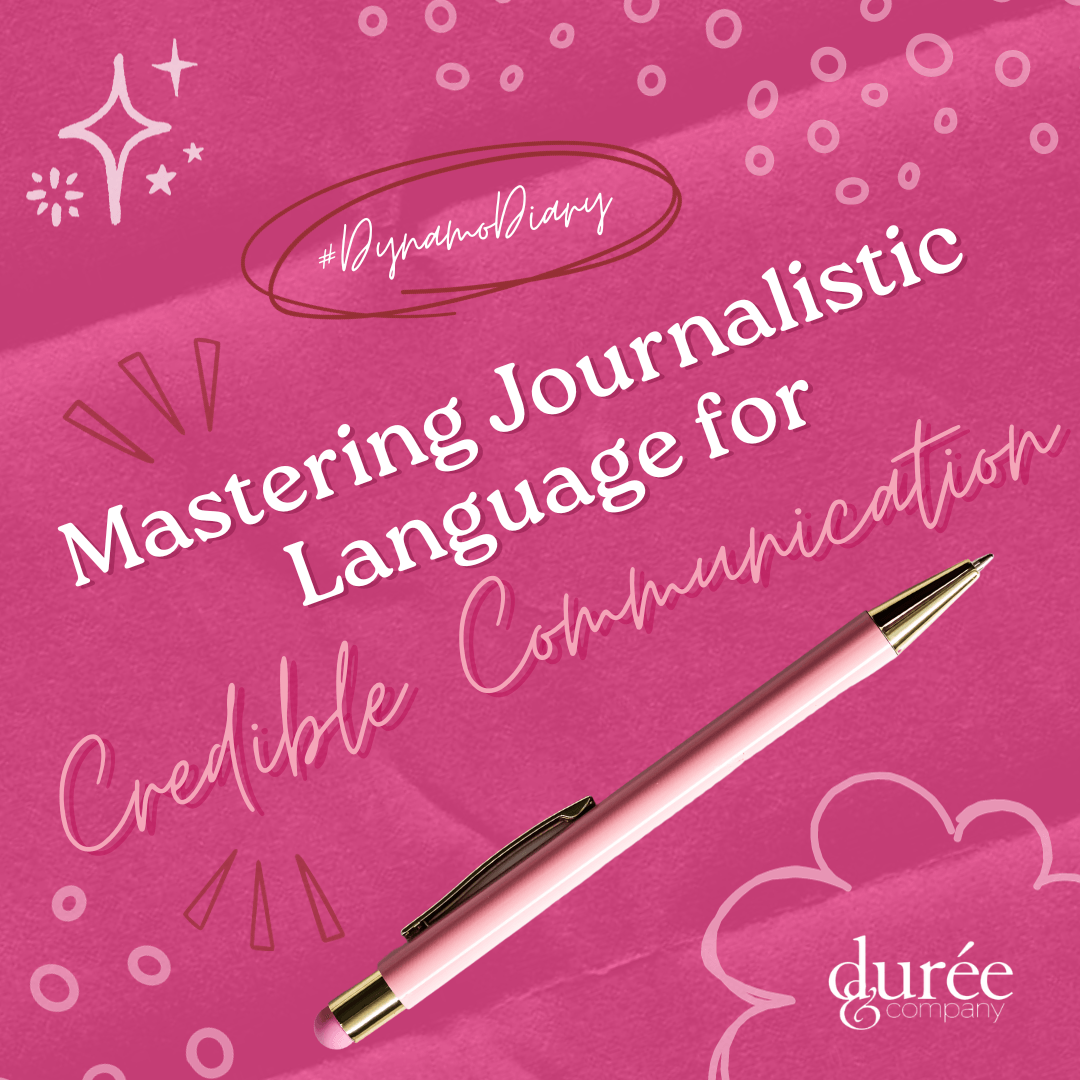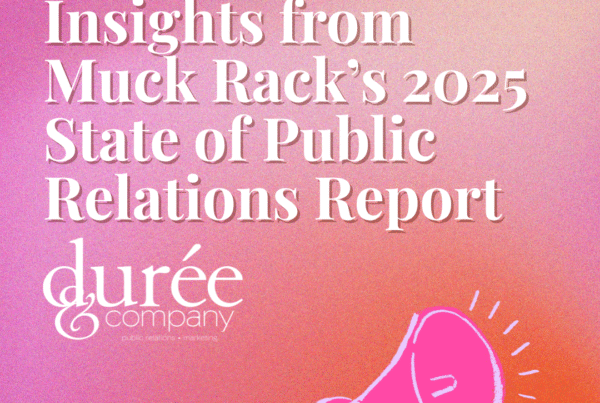
In the fast-paced world of media relations, speaking the same language as journalists is not just about communication—it’s about credibility. At Fort Lauderdale and Aspen-based public relations agency Durée & Company, we understand the power of language and its profound impact on relationships and reputation. Our expertise in navigating the complex linguistic landscape of journalism is not just a skill—it’s our craft. We use this knowledge daily to advocate for our clients, ensuring their narratives are not just heard but respected and understood.
Speaking AP Style
Better Communication with Journalists
Journalists live by the AP Stylebook—their linguistic bible. At Durée & Company, our fluency in AP Style means we communicate in a way that resonates with those in the newsroom. By maintaining an online subscription to resources such as the AP Stylebook, we ensure that our language is up-to-date and credible, mirroring the standards journalists themselves use.
The Art of Clarity
In public relations, clarity in communication is not just a goal—it’s a necessity. A key aspect of this is understanding the nuts and bolts of grammar that journalists hold dear. For example, the nuanced use of hyphens and dashes can dramatically alter the meaning of a sentence. Hyphens join words to form a single concept like ‘self-aware,’ whereas dashes—particularly the em dash—are used for emphasis or to denote a break in thought.
Consistency Across the Board
AP Style is the gold standard for media because it brings a consistent voice to varied reporting styles. It bridges the gap between different writing approaches, ensuring clarity and uniformity. Across newsrooms, AP Style is like a common dialect that keeps the news sharp and focused. For us in PR, it’s not about conforming, but about making sure our messages are as clear and reliable as the news people depend on every day.
Tips & Tricks for Hyphens and Dashes:
Hyphens ( – )
- Do use hyphens with certain prefixes and suffixes: e.g., ‘self-aware,’ ‘half-empty,’ ‘well-being,’ ‘sugar-free,’ ‘evidence-based,’ ‘pre-elect.’
- Do use hyphens in compound modifiers before a noun, except when modifiers are commonly recognized as a single concept without a hyphen, like ‘chocolate chip’ or ‘high school.’
- Do use a hyphen in ‘long-term care’ and similar phrases when they act as modifiers.
- Don’t use a hyphen in dual heritage names: e.g., ‘African American,’ ‘Asian American and Pacific Islanders.’
- Don’t use hyphens in words where they are no longer necessary, such as ‘antisemitism’ and double ‘e’ words, unless clarity demands it: e.g., ‘shell-like.’
- Don’t overuse hyphens. If a sentence feels cluttered with hyphens, it might need to be rewritten for clarity.
Special Cases
- ‘Co-worker’ should be hyphenated, whereas ‘coworking’ should not.
- ‘Layoff’ as a noun is one word, ‘lay off’ as a verb is two words, and ‘laid-off’ as an adjective is hyphenated.
Dashes ( — or – )
- Do use an em dash (—) for strong separation or emphasis, in place of commas or parentheses when they are insufficient.
- Do use an en dash (–) for indicating ranges, scores and dates: e.g., ‘Read pages 23–45,’ ‘The score was 3–1.’
- Do use a dash in a list to introduce items instead of a bullet.
- Don’t use a hyphen (-) when a dash is needed; they serve different purposes.
- Note: AP style recommends only using an em dash.
Stylistic Notes
- Capitalize the first word after a dash if it’s a standalone sentence and end with a period.
- Introduce a list with a colon if using bullets isn’t an option.
Tips & Tricks for Dates:
- Days: Refer to dates numerically without the ‘st,’ ‘nd,’ ‘rd,’ or ‘th.’ Use ‘1, 2, 3’ instead of ‘1st, 2nd, 3rd.’
- Months: Abbreviate months with more than five letters when paired with a specific date. However, when referring to the month alone, spell it out fully.
- Omitting ‘on’: Skip the preposition ‘on’ before a date unless it clarifies a potentially confusing sentence. So, it’s simply ‘Monday’ instead of ‘on Monday.’
- Commas: Avoid commas in partial dates, such as ‘March 20.’ Include commas for full dates, like ‘March 20, 1989,’ and always place a comma after the year within a sentence.
- Years and Decades: Omit the current year in dates. For past or future contexts, include the year. Write decades as ‘1980s’ or ’80s,’ with no apostrophe, and capitalize well-known periods like ‘Middle Ages’ or ‘The Great Depression.’
Cultural Competence in Communication
Race and Heritage
The language surrounding race and heritage is complex and ever evolving. We strive to use terms that are precise and respectful, avoiding generalizations. Whether distinguishing between ‘Latino’ and ‘Hispanic’ or capitalizing ‘Black’ when used as an adjective, we aim for the utmost accuracy and sensitivity.
Gender and Identity
We also navigate the intricacies of gender with care, recognizing that language must reflect society’s understanding of gender as a spectrum. From using ‘they’ as a singular pronoun to avoiding outdated terms, our language choices are inclusive and considerate.
Tips & Tricks for Race & Gender:
- Distinction Between Race and Ethnicity: Clearly differentiate between race (physical characteristics) and ethnicity (cultural identity) in descriptions and discussions.
- Respecting Individual Identifiers: While terms like ‘Latinx’ are recognized by AP style, awareness of regional and generational preferences is crucial. In places like South Florida, emphasize individual national identities, such as ‘Colombian’ or ‘Argentinian,’ which are often preferred over broader terms.
- Describing Indigenous Peoples: When referring to Indigenous peoples, be specific about the tribe or nation when possible, and use the names they use to self-identify.
- Avoiding Outdated Terms: Refrain from using terms like ‘Eskimo,’ which is considered derogatory by many. Instead, use ‘Inuit,’ ‘Yupik,’ or the specific name of the community.
- Minority Usage: Understand that ‘minority’ is a relative term and varies by location. Use it with caution and opt for more specific identifiers when possible.
- Gender Identity vs. Sex: Recognize and explain the distinction between gender identity (a personal sense of one’s own gender) and sex (biologically determined).
- Relevance to Content: Ensure that gender identity and sexual orientation are only mentioned when they are relevant to the subject matter or necessary for understanding the context.
- Transgender Respect: When referring to transgender individuals, respect their current gender presentation and use their chosen name, avoiding deadnaming.
- Inclusive Language: Use gender-neutral language whenever possible to avoid assumptions and to include non-binary and gender-nonconforming individuals.
- Pronouns: Respect and use people’s chosen pronouns. When in doubt, use their name or ask for their preference.
- LGBTQ+ Terms: Utilize ‘LGBTQ+’ as an inclusive term when speaking about the community as a whole but avoid using it to describe individuals unless they identify with the term.
Adding these points to the existing framework reinforces a nuanced, respectful approach to discussing race and gender, ensuring that the content is sensitive, accurate and inclusive.
Ethical Considerations
Accuracy in Quotations
When quoting, our policy is to preserve the speaker’s original words. Even when grammar or spelling is incorrect, we do not alter direct quotes, ensuring the authenticity and integrity of the communication.
Crime and Sensitivity
In reporting on crime or sensitive issues, specificity is crucial. We avoid stereotypes and labels, using language that accurately describes individuals and situations without resorting to generalizations.
Tips & Tricks for Reporting Crime:
- Precision: Be as precise as possible in describing the circumstances and individuals involved.
- Suspects: Use the term ‘suspect’ when referring to an individual at the time of arrest.
- Descriptive Language: Avoid dehumanizing terms such as ‘the homeless.’ Instead, use ‘people without homes.’ Similarly, use ‘migrant’ for people who move from place to place and ‘indigent’ for those who are very poor.
- Terminology: Understand the difference between terms like ‘climate change’ and ‘global warming,’ and use them appropriately.
By speaking the language of journalists, we at Durée & Company bridge the gap between the story and the storyteller. This strategy not only enhances our credibility but also ensures that our clients’ stories are conveyed with the accuracy and attention they deserve. We pride ourselves on our strong relationships with media professionals and our unwavering commitment to the highest standards of communication. Our day-to-day operations are imbued with the tools of our trade—from grammatical precision to cultural sensitivity—allowing us to represent our clients in the most credible and effective manner. In a world where every word counts, we make sure that every narrative we craft and every message we convey is not just seen but felt and understood. Contact us today to start the conversation and create a language of success together.
About Durée & Company, Inc.
Founded in 1999, Durée & Company is a full-service, well-respected and highly creative public relations and marketing agency serving a diverse client base of local, national and international consumer brands, landmark industries, business leaders and philanthropists from its offices in Fort Lauderdale, Florida and Aspen, Colorado. Practice areas include real estate, nonprofit, hospitality, business, lifestyle, health and wellness, legal, yacht and marine as well as cannabis, psychedelics, and other emerging industries. Durée & Company is the proud recipient of four notable 2023 awards: Bulldog PR Bronze Level for “Best Crisis Management,” Cannabis Marketing Association Seven Award for “Best Use of PR,” Fort Lauderdale magazine “Best of Fort Lauderdale Top PR Agency” and PR News’ People of the Year Award. Durée & Company is a member of PR Boutiques International™ (PRBI), an elite organization of global public relations professionals. To learn more, call 954-723-9350; go to dureeandcompany.com; cannabismarketingpr.com; or psychedelicpr.com. Join the social conversation and follow Durée & Company on Facebook, Instagram, X (Formerly Twitter), YouTube and LinkedIn at @DureeCoPR.








